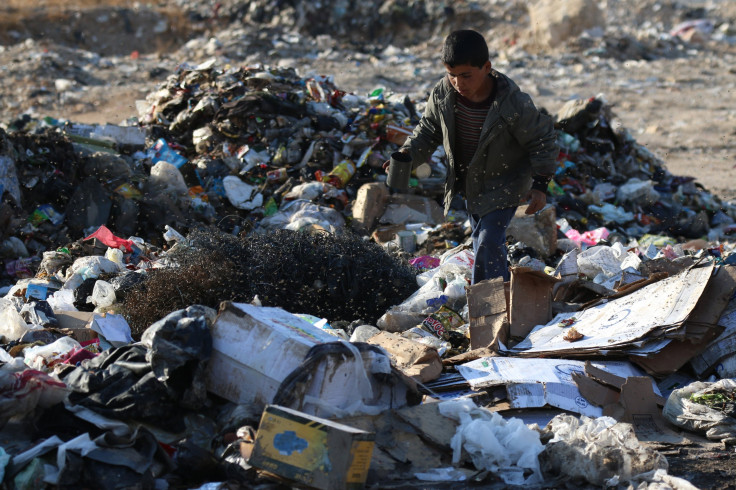Syria Talks: For First Time In 4 Years, US Meets With Iran And Russia To Draft Framework For Syria Political Transition

For the first time since the Syrian civil war began four years ago, and after the deaths of hundreds of thousands of people, U.S. Secretary of State John Kerry will for the first time meet with the foreign ministers of Iran and Russia to find a way to end the fighting. The diplomatic talks will be held in the Austrian capital Vienna Friday.
U.S. officials have vowed that they will only agree to a political transition framework that sidelines President Bashar Assad and eventually removes him from power. Iran and Russia, though, are long-time allies of the leader and show no sign of backing down. The opposing views on the president and his role in government will most likely prolong diplomatic talks for months, analysts say.
If successful, however, the talks will produce a plan that outlines a path toward a lasting political future for Syria, U.S. officials said. The only question is whether that framework will include a clear path and timeline for Assad’s exit. Even so, the talks that will include at least 10 other countries, will not yield a decisive framework right away, analysts say, because of competing interests among participating countries.
It could take months to finalize a framework, said Daniel Serwer, an expert on Syria at the Middle East Institute, a think tank in Washington. For the past four years Iran and Russia have propped up Assad by sending weapons and fighters to help pro-regime forces fighting the rebels. Last month Russia began bombing Syrian rebels from the sky, saving Assad from what was almost certain defeat. Other participants such as the U.S. and Saudi Arabia are actively involved in supporting the opposition. Millions of dollars have been spent on both sides.

Still, there is a stalemate in the country that U.S. officials say can only resolve itself with a series of diplomatic talks that include all stakeholders, including Iran.
“If you are going to have a political solution in Syria … you are going to have to have a conversation with Iran about this,” State Department spokesperson John Kirby said, in a press briefing.
Most peace talks on the Syrian civil war have been brokered by the United Nations and included members of the opposition supported by the U.S., and officials of the Assad regime. All ceasefires and peace deals have broken down and forced one U.N. ambassador to Syria to resign.
On Friday the U.S. is looking for “a framework for a political transition in Syria that can work,” Kirby said, in the briefing, adding that the U.S. is looking for a plan “that doesn’t include Bashar Assad and can be enduring and stable.”
Russia and Iran have yet to publicly lay out their goals for the talks, but several Middle East news outlets printed a leaked political transition proposal drafted by Russia. The Russian proposal includes a personal pledge from President Vladimir Putin that Assad will not participate in the next elections but it does not prevent members of Assad’s family or Syrian government figures from standing for elections. However, analysts say Russia cannot be trusted with its political statements.
"The way Russia has approached Syria has been very irresponsible," said Anna Borshchevskaya, an expert on Russian policy in Syria from the Washington Institute for Near East Policy, a think tank. "Putin sees the world in a very zero sum way. He likes to accuse the U.S. of being unilateral but actually it was his intervention [in Syria] that was unilateral."
When it started dropping bombs in Syria, Russia said that it would only target the Islamic State group, but U.S. officials have accused the country of targeting moderate rebels armed by America.

The U.S. administration said it had evidence that lead it to believe Russia hit a hospital in Syria with an airstrike, Kirby said Thursday.
Russia has been accused several times in recent weeks of hitting hospitals in Syria. Last week the Syrian American Medical Society said Russian airstrikes killed least 12 people in a hospital in the northwestern province of Idlib. At least 595 people have been killed by Russian airstrikes in Syria so far, the Syrian Observatory for Human Rights, a monitoring group, said Thursday.
The Observatory said it has been tracking the loss of life caused by the Russian air campaign in Syria. So far, it has documented the deaths of 185 civilians, 131 ISIS fighters and 279 members of opposition groups.
The unpredictability of Russia's intervention in Syria is, in some analysts' view, not the biggest issue for the U.S. Iran, they say, poses the biggest threat to the success of the talks in Vienna, and the U.S. has no experience of negotiating with the country in the context of the Syrian war. But U.S. officials say that there is no other way to move forward with the diplomatic talks other than to include and cooperate with Iran.
"[Iran has] an opportunity to be a more constructive power in the region and to help the international community to do the right thing here which is create a process by which the Syrian people can have a … representative government. [But] we have been exceedingly clear about the whole scope of Iranian activity with respect to terrorism," Kirby said Thursday of Iran supporting Hezbollah, a pro-regime force in Syria. "We are going to continue to press Iran on their activities."
The meetings in Vienna will take place throughout the day, and Kerry will take part in both bilateral and multilateral meetings with all participants.
© Copyright IBTimes 2024. All rights reserved.




















